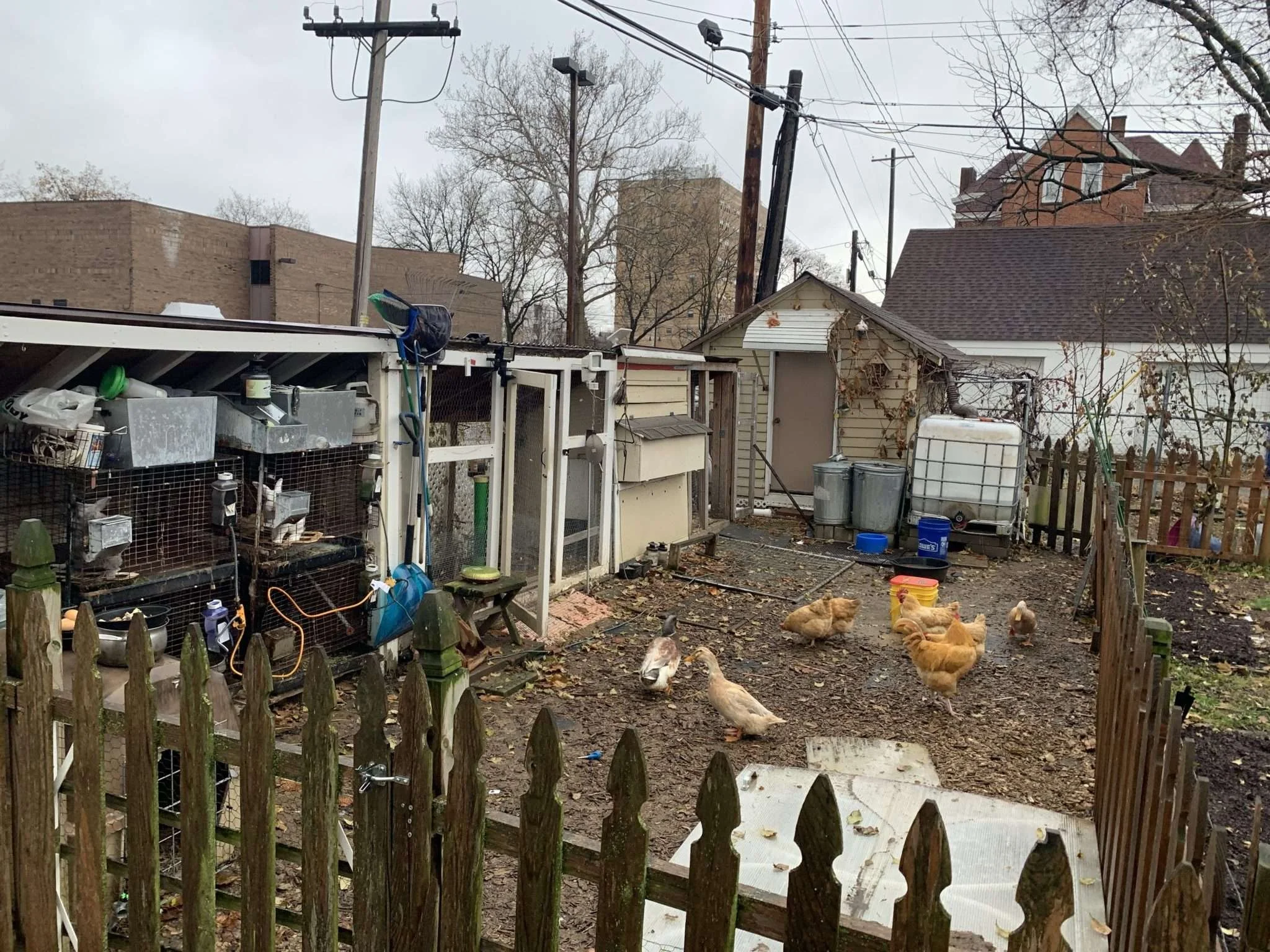
Become a Volunteer at Mezzacello Today
If you are new to Mezzacello Urban Farm this page will introduce you to the way that Mezzacello is managed and operated.
-
This involves caring for, feeding, securing, and watering the chickens, ducks, rabbits, fish, and insects (depending on the season)
General Security:
For security we always leave the east gate to the chicken yard closed as well as the north gates from the chicken yard into the garden. The west gate to the rear of the chicken yard can be left open. ALL other gates into the western gardens are to remain closed and latched. [See Mezzacello Plan View Diagram]
Coop Security:
The coops are currently manually operated, although there is a plan to automate this part of the coop coming in 2020. The birds (chickens and ducks) should be locked away safely in the coop each night, and released in the morning. In the event that they cannot be released the next day, please insure that there is food in the in-coop feeder (See livestock feeding) and that they have access to water. (See livestock watering).
-
This will be a breakdown of feeding by species. To make this easier, each 30 gallon can is labelled and instructions are provided inside the tight fitting lid of each can. Please be sure to tightly re-secure each lid to discourage predators and keep rain out.
-
The chickens and ducks both eat pelletized corn and grasses. These pellets are kept in the livestock shed and the poultry run has a treadle feeder in it that needs refilled every two weeks.
Their feed is located in the 10 gallon bin with a chicken on it. There is also a bin with candy on it that reads treats. This is scratch grains, sunflower seeds and popcorn that I give the birds occasionally.
You can feed chickens and ducks human food, but try to avoid potatoes, tomatoes, onions, or avocado. They cannot digest that.
-
The ducks use the same feeder as the chickens. The only nutritional addition to the ducks is occasionally I will feed them mealworms, brewer's yeast, and peas to increase their niacin uptake.
Ducks are picky eaters. They love cat food (only one scoop which you will find in the can behind scratch grains) and they love corn and oats as well. In a pinch, they LOVE water hyacinth from the pond. It is a very duck-specific treat.
-
Description text goes here
Rabbits:
Rabbits are fed every other day with either rabbit feed (located to the left of the rabbit warren cages in a can) or fresh greens from the garden, or clover from the ground. Rabbits are strictly herbivores. They cannot eat meat or animal proteins.
Fish:
The fish should be fed daily in season (April-October) one cup of fish feed is appropriate. Fish feed is found by the pond bench in a small steel can with a lid.
In their dormant season (October-April) the fish are in hibernation and require little care.
Livestock Watering:
Watering strategies by species:
Chickens:
Chickens usually drink out of the waterer bowl in the chicken yard.
In the warmer months (April-November) one can refill the chicken water station with water from the rain barrel in the livestock yard (located by the feed can station in front of the storage shed). There is a nozzle that one turns to draw water. In the even that rain barrel is empty, pond water can be used, or water from the other rain barrel against the house can be brought over.
In the winter months (November-March) there is a heated blue bowl that keeps water liquid. Just refill it every other day or when it is too dirty.
Ducks:
Ducks MUST have access to water deep enough to dunk their heads or they will suffocate. They usually drink out of the waterer bowl in the chicken yard. It is at least six inches (15cm) deep. Ducks dirty water pretty quickly, so be advised.
Water in the coop at night. There is a three-gallon waterer in the coop specifically for the ducks. It is deep enough for them to keep their bills wet and stable enough that they won't know it over. Ducks need less water in winter months.
Rabbits:
Rabbits have automatic waterers that contain heaters for the winter months. This is a no brainer. Just make sure they have water.
Fish:
The fish live in water. They are good to go.
Maintenance and Safety:
In general, the livestock yard is a low key place. If everyone has food and water we are good to go.
You must not wear the shoes you will wear during the day in the yard. Shoes and boots will be provided by the livestock yard’s southeast gate (The gate into the livestock yard by the pond ecosystem). Please always change your shoes.
Wastes:
Hand Sanitation:
One important safety caveat to working
in the livestock yard:
Garden Volunteer
Watering:
Construction Volunteer


